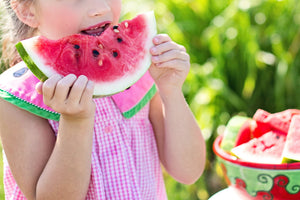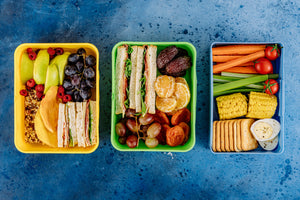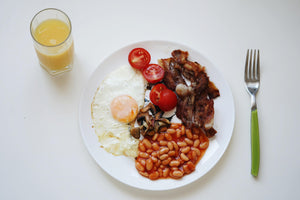As toddlers develop their independence, they will become more picky eaters. Due to their need for variety in their diet, picky eaters are a common problem for parents as they wish to provide them with the best food for toddlers. Toddlers need food that appeals to their evolving palates and meets their nutritional needs so they can stay energetic and develop at a healthful rate. To assist you to make sure your toddler's diet is nutrient-rich and maintains his health, mentioned below is a food chart for kids.
-
Breast milk
The ideal nourishment for a baby is breast milk up to and including age one year. For the infant to receive the best nourishment, put on weight, and develop healthfully, exclusive breastfeeding is required for up to six months. A mother must consume foods high in vitamins, protein, and minerals to boost milk production in an attempt to nourish a newborn.
-
Chapattis or cereals (10 months), and boiled veggies (7 months)
You can introduce finger meal food for babies that your youngster can eat on his own around the age of one. Try feeding some milk-soaked morning cereal, such as dalia or cornflakes. You could also serve chapatti or stuffed veggie paratha that has been chopped into little pieces and coated with ghee. If you consume meat, include some chicken that has been shredded with your meal.
-
Fruits (6 months)
Banana, mango, chikoo, custard apple, and other fantastic options can be offered as sliced fruits after six months of age or blended into milkshakes, and custard can be given from seven months on. With any of these fruits and a dash of curd and powdered almonds, you can prepare smoothies. 105 calories are present in 100 grammes of bananas, making them a natural supply of both carbs and energy.
-
Eggs (1 year)
Besides being a great way to boost calories, eggs are also excellent iron-rich foods for toddlers. Boiled, fried, or omelettes eggs are all acceptable egg preparations. Incorporating eggs into pancakes, custard, or chapati roll stuffing is another excellent method to include eggs in your diet. Once your infant has reached the age of one, you can introduce eggs.
-
Meat/Fish/Poultry (7 months)
Fish is a fantastic provider of omega-3 fatty acids, which are crucial for hormones and are also considered one of the baby's brain development food. They are abundant in proteins and vitamins. Niacin, phosphorus, magnesium, Vitamin B12 and B6 are all abundant in chicken. Curry made with chicken and rice could be presented as a soup, stew, or side dish.
-
Cheese and paneer (12 months)
Using whole milk, you may create paneer by yourself. Give your child this in the form of finger food after chopping them into bite-sized pieces. It is a delicious snack to enjoy on its own or as a stuffing in parathas or rice-based curries. A further food that is high in calcium and aids in children's growth is cheese. A cheese slice is a delicious and nutritious snack that may be eaten on its own or combined with other foods like chapatis, pasta, or sandwiches.
-
Avocados (6 months)
Avocados are a great healthy snack for toddlers and young children because of how many calories and fat they contain. Avocado tastes fantastic in dips, soups, sauces, smoothies, spreads, and other high-calorie dishes for growing toddlers. Kids enjoy the texture's mushy and pulpy qualities.
-
Ragi (7 months)
Ragi, excellent Indian food for babies' weight gain, is given to infants as a porridge starting at Seven months of age. Toddlers may gain weight by eating ragi porridge that has been cooked in water with jaggery and ghee. Ragi fills up the stomach and keeps it filled for a long time in newborns.
-
Pears (6 months)
A pear could be consumed as puree and is a fantastic source of nutritional fibre, iron, vitamin B6, and vitamin C. For your kid who is three months old, prepare an apple and pear puree and sprinkle some powdered cinnamon on top for taste.
-
Whole milk, curd, or yoghurt
For more calories, top your baby's kheer, oatmeal, and halwa with full-fat milk. Serve full-fat milk curd to infants older than seven months after setting it from the milk. Curd could be added to fruits and smoothies.
-
Lentils such as urad and moong dal (7 months)
The brain develops as a result of the protein, calcium, and EFA content of urad dal and moong dal. When serving khichdi along with ghee and rice on top, moong dal could be added. Add some veggies to reach the recommended daily intake. Idlis are a nutritious, steamed dish that is loaded with protein and carbs that can be made using urad dal.
- Starchy Vegetables (7-9 months)
Healthy fats are abundant in starchy vegetables like potatoes and sweet potatoes. Children adore cheese and mashed potatoes, which are a great combination of carbs and energy from potatoes. The sweet potato is high in beta-carotene and sugar. It effortlessly increases calorie density.
-
Ghee (8 months)
Ghee is a key component of Indian cuisine and is regarded as one of the greatest meals for weight gain and digestion. It is advised to add one teaspoon of ghee to a baby's diet each day. Use homemade ghee whenever possible when preparing curries and other dishes for your child.
-
Peanut Butter (1 year)
Before introducing peanuts to your kid, please check your physician if there is a previous history of peanut allergies. Because peanut butter naturally contains fat and oil, it is high in calories. Peanut butter can be spread on bread, fruit, biscuits, and sandwiches.
-
Tofu
Tofu is a fantastic meat substitute for vegans since it is high in iron. Before serving tofu to your toddler, chop it into strips and sauté it with a dip. Toddlers who are dairy intolerant could also eat it.






